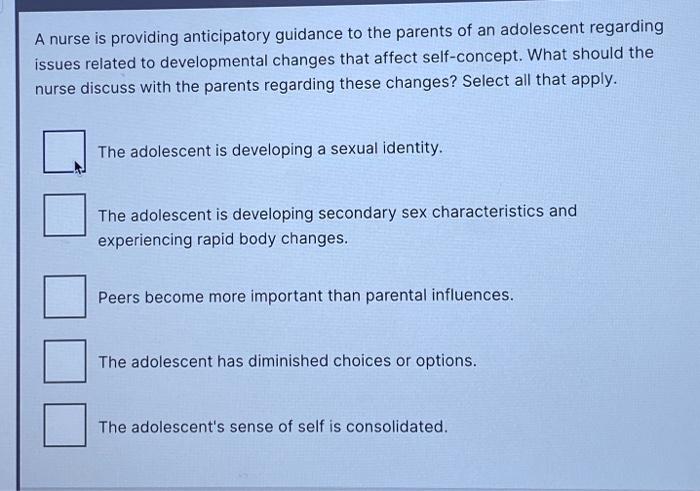A nurse is providing anticipatory guidance about child development, which plays a pivotal role in fostering healthy child development by providing parents and caregivers with essential information and support. This guidance empowers individuals to proactively address developmental milestones, anticipate potential challenges, and promote optimal outcomes for children.
Throughout a child’s journey from infancy to adolescence, nurses serve as trusted sources of knowledge, providing evidence-based information on physical, cognitive, and emotional development. They recognize individual variations in development, tailoring guidance to meet the unique needs of each child and family.
Importance of Anticipatory Guidance in Child Development: A Nurse Is Providing Anticipatory Guidance About Child Development
Anticipatory guidance is a proactive approach in healthcare that provides parents and caregivers with information and support regarding their child’s growth, development, and potential health concerns. By providing guidance before issues arise, nurses play a crucial role in promoting healthy child development and reducing parental anxiety.
Examples of anticipatory guidance include discussing milestones, nutrition, safety, sleep, and behavior management. By addressing these topics in advance, parents can be better prepared to meet their child’s needs and promote optimal outcomes.
Benefits of Anticipatory Guidance
- Reduces parental anxiety by providing knowledge and reassurance.
- Improves child outcomes by promoting early detection and intervention of potential health concerns.
- Strengthens the nurse-family relationship by building trust and communication.
- Empowers parents to make informed decisions about their child’s care.
Stages of Child Development

Infancy (Birth to 12 Months), A nurse is providing anticipatory guidance about child development
- Physical: Rapid growth, head control, rolling, sitting.
- Cognitive: Object permanence, language development, social smiling.
- Emotional: Attachment to caregivers, stranger anxiety.
Toddlerhood (1-3 Years)
- Physical: Walking, running, climbing, fine motor skills.
- Cognitive: Language explosion, problem-solving, imaginative play.
- Emotional: Independence, self-awareness, temper tantrums.
Preschool (3-5 Years)
- Physical: Increased coordination, gross motor skills, potty training.
- Cognitive: Pre-reading and writing skills, counting, social interaction.
- Emotional: Cooperative play, empathy, self-control.
Common Concerns and Questions from Parents
Nurses frequently encounter concerns from parents regarding their child’s growth, behavior, and development. These concerns may include:
- Feeding and nutrition
- Sleep patterns
- Toilet training
- Developmental milestones
- Behavior management
Nurses provide evidence-based information and resources to address these concerns, including growth charts, developmental checklists, and parenting support groups. They also engage in active listening and provide reassurance to parents.
Methods of Providing Anticipatory Guidance

Nurses use various methods to provide anticipatory guidance, tailored to the needs of individual families:
Individual Consultations
- One-on-one sessions with parents and caregivers.
- Provide personalized guidance and address specific concerns.
- Allow for in-depth discussions and Q&A.
Group Sessions
- Gatherings with multiple parents and caregivers.
- Share information and facilitate discussions on common topics.
- Provide a supportive environment for peer learning.
Written Materials
- Brochures, handouts, and online resources.
- Provide written information on specific topics.
- Can be used as a reference for parents.
Ethical Considerations

Nurses must consider ethical issues when providing anticipatory guidance:
Respecting Parental Autonomy
- Parents have the right to make decisions about their child’s care.
- Nurses should provide information and support without imposing their own values.
Maintaining Confidentiality
- Information shared by parents should be kept confidential.
- Nurses must adhere to privacy regulations and ethical guidelines.
Avoiding Bias
- Nurses should provide unbiased information and avoid personal opinions.
- They should be aware of their own biases and seek supervision if necessary.
FAQs
What is the significance of anticipatory guidance in child development?
Anticipatory guidance equips parents and caregivers with knowledge and support to proactively address developmental milestones, anticipate potential challenges, and promote optimal outcomes for children.
How do nurses provide anticipatory guidance?
Nurses use various methods to provide anticipatory guidance, including individual consultations, group sessions, and written materials, tailoring the approach to meet the needs of different families.
What are some common concerns parents have about their child’s development?
Parents often have concerns about their child’s growth, developmental milestones, and behavior. Nurses provide evidence-based information and resources to address these concerns and offer reassurance and support.